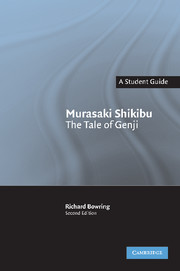4 - Impact, influence and reception
Published online by Cambridge University Press: 05 June 2012
Summary
Early textual history
Our nation's greatest treasure is the Genji monogatari. Nothing surpasses it.
(Ichijō Kanera, 1402–81)Few who read the Genji in English, French, or indeed modern Japanese, are aware that the translation is based on a text that is the end result of much collation and editorial activity. The editor is faced with a whole series of different texts from which to choose. We have here yet another reflection of a major theme of the Genji itself: experience shows that origins and authentic versions are forever lost to us and yet we continue to seek them, submitting ourselves to their fatal lure. In the case of the Genji one reaches back to an apparent source, only to find it turning into a mirage:
The time for the return to the Palace was approaching, but we were constantly rushed off our feet. Her Majesty was involved in her book-binding, and so first thing every morning we had to go to her quarters to choose paper of various colours and write letters of request to people, enclosing copies of the stories. We were also kept busy night and day sorting and binding work that had already been finished …
Then, while I was in attendance, His Excellency sneaked into my room and found a copy of the Tale that I had brought from home for safe-keeping. It seems that he gave the whole thing to his second daughter. I no longer had the fair copy in my possession, and was sure that the version she now had would hurt my reputation.
- Type
- Chapter
- Information
- Murasaki Shikibu: The Tale of Genji , pp. 76 - 95Publisher: Cambridge University PressPrint publication year: 2003



